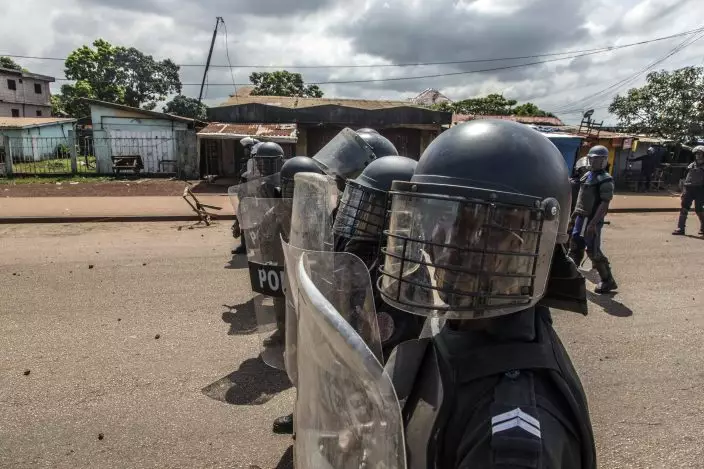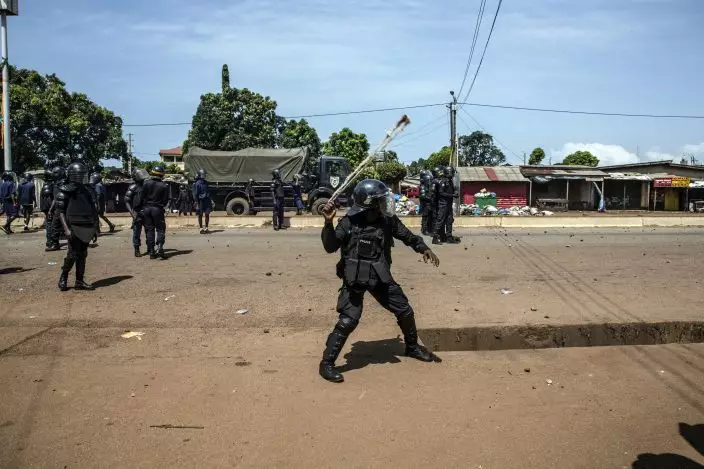Gunfire rang out across Guinea's capital on Wednesday and authorities reported at least nine deaths across the West African country as tensions mounted in anticipation of official results being released from a weekend presidential election.
Security forces fired tear gas to disperse opposition supporters who had erected barricades in the streets after just a few partial election results were released the night before — all showing President Alpha Conde in the lead.
Election officials have said it could take until the end of the week to gather and count all ballots from across the West African country. But opposition candidate Cellou Dalein Diallo already has declared himself the winner of Sunday's election without citing figures, and his party already has put out a statement referring to him as “President.”

Police face supporters of Guinean opposition leader Cellou Dalein Diallo in Conakry, Guinea, Wednesday, Oct. 21, 2020. Diallo declared himself winner against incumbent President Alpha Conde in Sunday's presidential elections.(AP PhotoSadak Souici)
Guinea's security ministry said Wednesday that four gunshot victims had been brought to local morgues in the capital, Conakry, while three other deaths were recorded in Kissidougou. A police officer was lynched to death in Bambeto and another officer was fatally stabbed elsewhere, the government said.
Diallo’s claim of victory infuriated supporters of the incumbent president, who had sought constitutional changes earlier this year so that he could seek yet another term. Sunday marked the third time that Conde and Diallo faced each other in a presidential election.
Many fear that Diallo's declaration could now lead security forces to crack down on his supporters, many of whom like him come from the Peuhl ethnic group. The president belongs to the Malinke ethnic group, and his past electoral match-ups against Diallo in 2010 and 2015 have seen bursts of intercommunal violence between the country's two largest ethnic groups.

Police engage supporters of Guinean opposition leader Cellou Dalein Diallo demonstrating in Conakry, Guinea, Wednesday, Oct. 21, 2020. Diallo declared himself winner against incumbent President Alpha Conde in Sunday's presidential elections.(AP PhotoSadak Souici)
Conde’s backers have called Diallo's declaration of victory “irresponsible and dangerous." His party called Tuesday on “the competent institutions to take all necessary measures to prevent disorder and to prevent any attempt to destabilize the country and its legitimate institutions.”
Already more than 50 people had died amid violent protests over the past year as Conde sought to amend the country's constitution in March through a referendum so that he would be eligible to run again. Under the changes, Conde's first two terms no longer count toward the limit, giving him the possibility of serving up to 10 more years in power.
In a statement issued on the eve of the poll, U.N. Secretary-General Antonio Guterres “urged all political leaders and their supporters to refrain from acts of incitement, inflammatory language, ethnic profiling and violence.”
Conde came to power in 2010 in the country’s first democratic elections since independence from France in 1958. Many saw his presidency as a fresh start for the mineral-rich country mired by decades of corrupt, authoritarian rule.
Opponents, though, say he has failed to improve the lives of Guineans, most of whom live in poverty despite the country’s rich resources. In his final campaign speech, Diallo highlighted the country’s high unemployment and human rights abuses of the past decade.
Associated Press writer Krista Larson in Freetown, Sierra Leone, contributed to this report.


